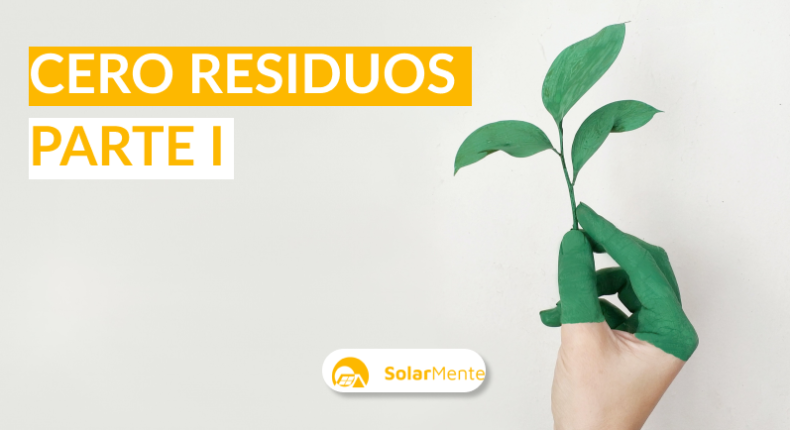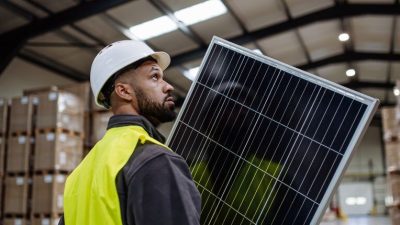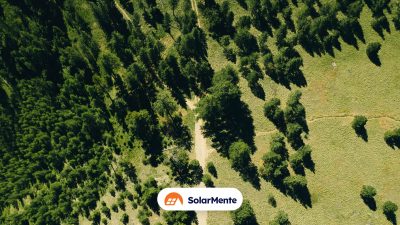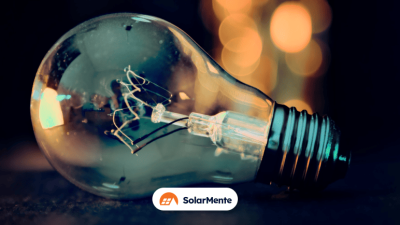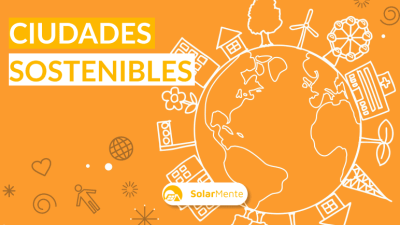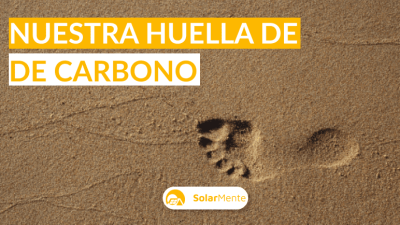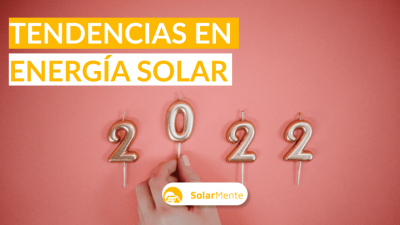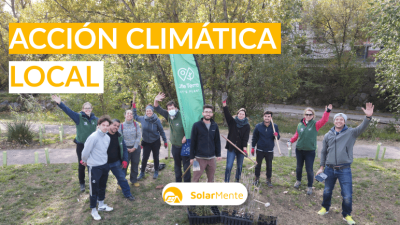Have you ever analysed all the waste we generate?
In Spain, each person generates almost half a tonne of waste per year in their homes.
Beyond that, in 2020, 40.5% was recycled in Spanish territory. A percentage that does not reach the 50% set by the regulations.
Taking into account these high levels, it is important to stop and be aware of the environmental impact we generate with our consumption habits. It is not simply a matter of recycling, but of changing certain behaviours before purchasing.
And this is exactly what the Zero Waste movement promotes. A new way of managing and treating waste. We are talking about a mentality oriented towards sustainability and responsible consumption.
Today we explain what zero waste is and how we apply it at SolarMente.
What is zero waste or zero residue?
Bea Johnson sparked a movement with her blog in 2006 and her book Zero Waste Home with tips for a zero waste lifestyle. Actionable tips that have shaped the zero waste lifestyle movement.
The main goal of the zero waste philosophy is to avoid large amounts of waste in landfills.
Using reusable grocery bags (preferably cloth) instead of plastic or paper ones is part of zero waste. Consider that each plastic bag takes between 100 and 1,000 years to degrade.
Shopping at local farmers’ markets, where there is little or no packaging used for produce, is also part of the movement, as is avoiding buying packaged food.
The 5Rs to be zero waste or zero-waste
1. Refuse
It is important to learn to say no.
We have become robots in the way we accept things. To learn to refuse is to look twice and ask yourself:
Do I really need this?
Refusing helps reduce the amount of items that are brought into the home that need to be dealt with. You have less waste to recycle, reuse and dispose of, which makes this first step the easiest and most important.
2. Reduce
Focus on simplifying and reducing the number of possessions.
In your home, you can leave all the things you don’t use or need to make them available to your community. Therefore, at certain times, there will be less waste to dispose of.
In short:
Fewer products = less waste.
3. Reuse
Swap anything disposable for a reusable alternative.
Here are a couple of options to get you started today:
- Swap paper towels for rags, tissues and paper napkins for cloth ones.
- Go to the shop with a reusable kit: glass jars, mesh bags or cloth bags to buy your food unpackaged.
Reusing is more than just reusing things that are already in the house, it’s also about avoiding bringing home new items.
4. Recycle
The fourth rule of the zero waste lifestyle is to recycle, but only what we cannot refuse, reduce or reuse.
The zero waste lifestyle does not encourage more recycling, but less, by preventing waste from entering your home in the first place.
5. Compost (R for Rot)
With the zero waste movement there are amazing composters on the market that can meet anyone’s needs.
Whether you eat meat or not, whether you have a family of four, whether you live in a flat or in the country, there are different systems for all needs.
SolarMente as a zero waste or zero waste company
In our offices we reduce, reuse, recycle waste and constantly look for circular economy opportunities for the waste we can’t avoid generating.
Our Solid Waste Management Policy and Plan contains key actions implemented to reduce waste:
Waste reduction: implementation of 5R policies 2.
We have procedures for reuse, recycling and responsible disposal where reduction is not possible.
We differentiate between inorganic and recyclables. For example: glass, cans, paper, aluminium, cardboard or plastic.
2. Participation in urban gardens and reduction of food waste.
We convert organic waste into compost.
For this purpose, we actively collaborate with the urban garden of the Poblenou neighbourhood ConnectHort together with the organisation Abono Km0.
We are part of this initiative that has accompanied us on our path towards sustainability to achieve the goal of revaluing 100% of the organic waste from the office.
In this way, we participate in the composting network and transform our organic waste into compost, actively collaborating with community gardens in our neighbourhood.
95% of the food we eat comes from the soil, which depends on biodiversity to be healthy and fertile.
Therefore, we should pay attention to composting and the positive effects of turning every citizen’s mineral-rich food waste into compost.
3. Making more sustainable consumption choices
Here are the sustainable consumption measures that we at SolarMente have adopted and that you can replicate in your home:
- Reduce and/or eliminate the use of paper: take advantage of digital tools to share files.
- Switching to recycled paper: not only helps to reduce the demand for virgin paper products (and therefore reduce the demand for logging and deforestation), but also reduces carbon emissions.
- Elimination of disposable products (use of plates, cutlery and water bottles): we encourage the team to use reusable coffee cups, water bottles, take-away containers and bags in general. We avoid single-use plastic bottles with water bottles in the office.
4. Actions to encourage waste reduction and responsible waste management among team members.
At SolarMente, we raise awareness, which is what is most needed, but we also involve the whole team.
When our offices opened, there was no recycling. The amount of waste bags generated per week averaged 3 bags and grew to a total of 12 bags each month.
After three months of corrective action, the numbers improved. On average per month they generated
- Two plastic bags
- One and a half cardboard or paper bags
- One and a half bags in organics
To achieve significant change, the involvement of the people in the organisation makes a big difference. Thus, we have improved our efficiency and recycling by 58%, in addition to switching to compostable bags.
We align with the SDGs to achieve zero waste
SDG 12. Responsible production and consumption
We contribute to SDG 12 with measures that minimise the use of disposable products and consumables.
We encourage separate collection and maximum recycling of waste generated, including food waste, and its disposal prior to treatment.
SDG 17. Partnerships to achieve the goals
We participate in working groups through which we carry out collaborative development in the field of sustainability and exchange experiences and best practices in this field.
It is clear to us that achieving zero waste is a gradual process. Through reuse, recycling and proper disposal, we aim to reduce waste to zero in our company.
The importance of acting locally to achieve zero waste
You have already seen throughout the article that the actions taken by the zero waste movement are very simple.
Think about the environmental impact of our actions and the health problems caused by the emission of harmful gases.
For this reason, at SolarMente, as well as working on measuring our corporate carbon footprint and seeking to reduce the emissions associated with our activity, we have an action plan to make us a zero waste company.

